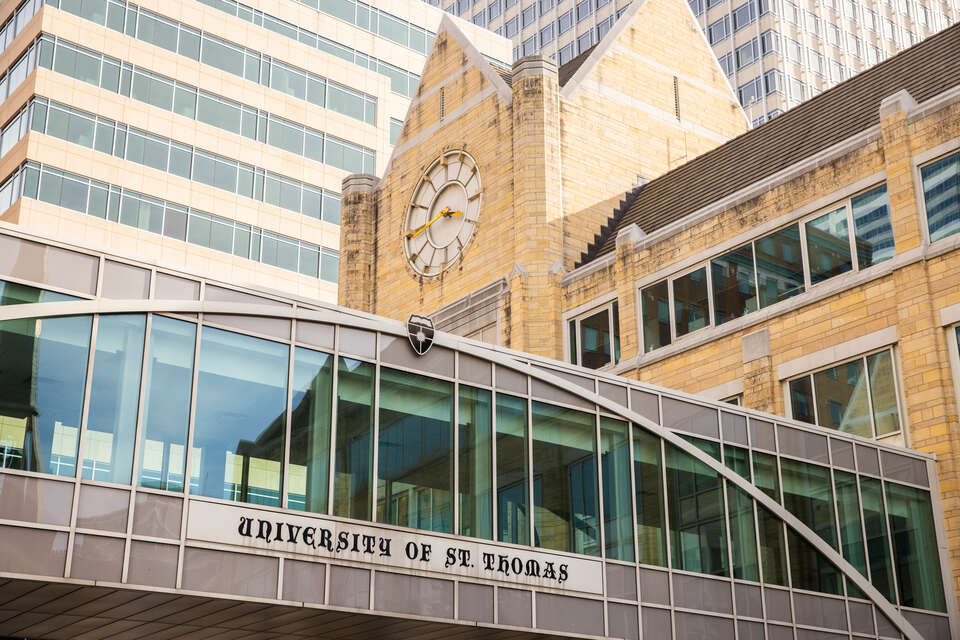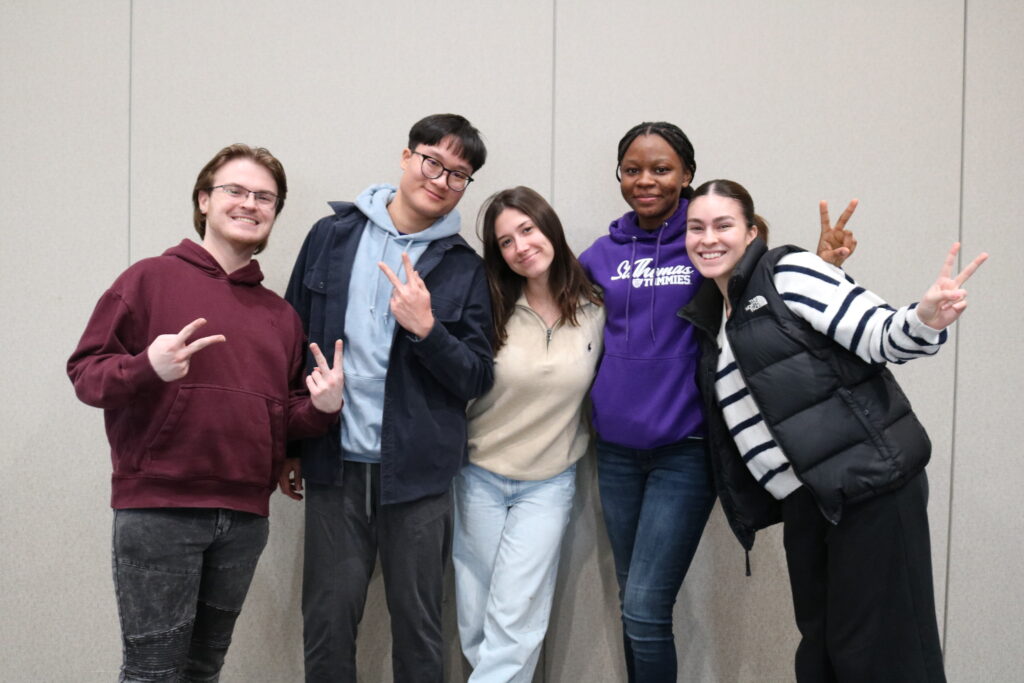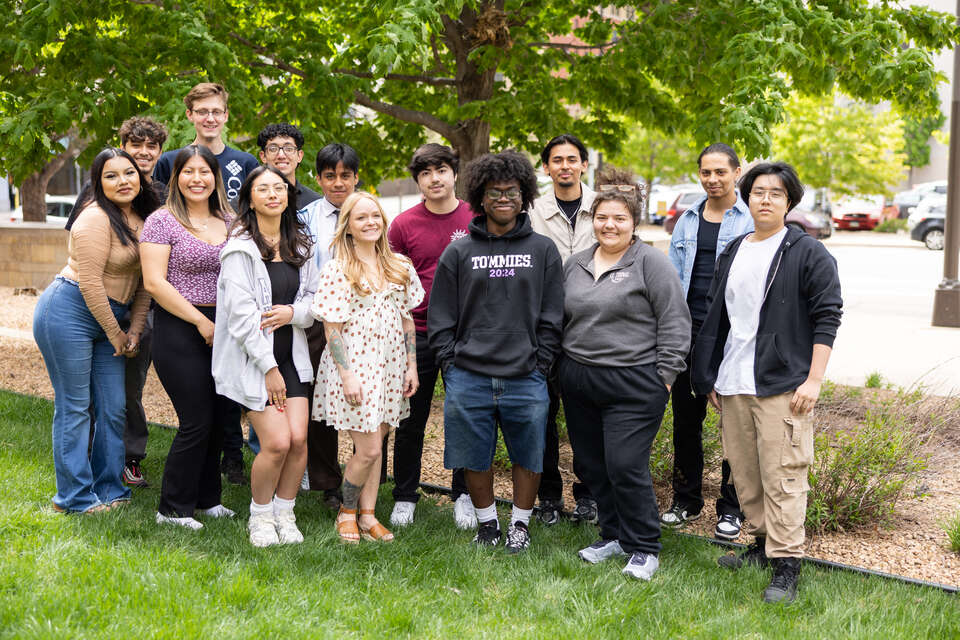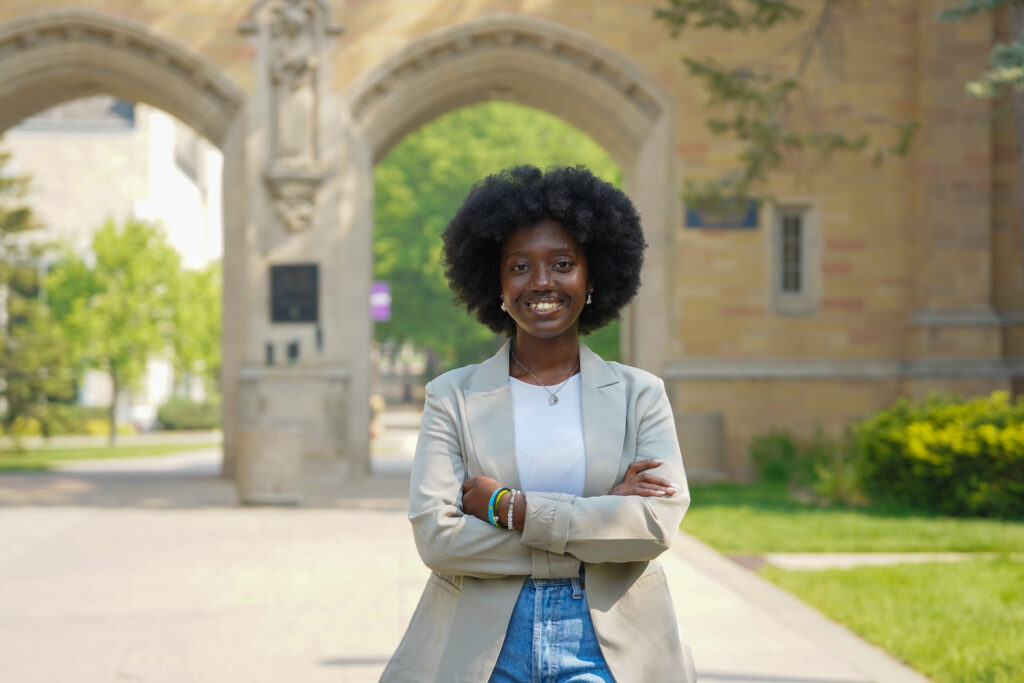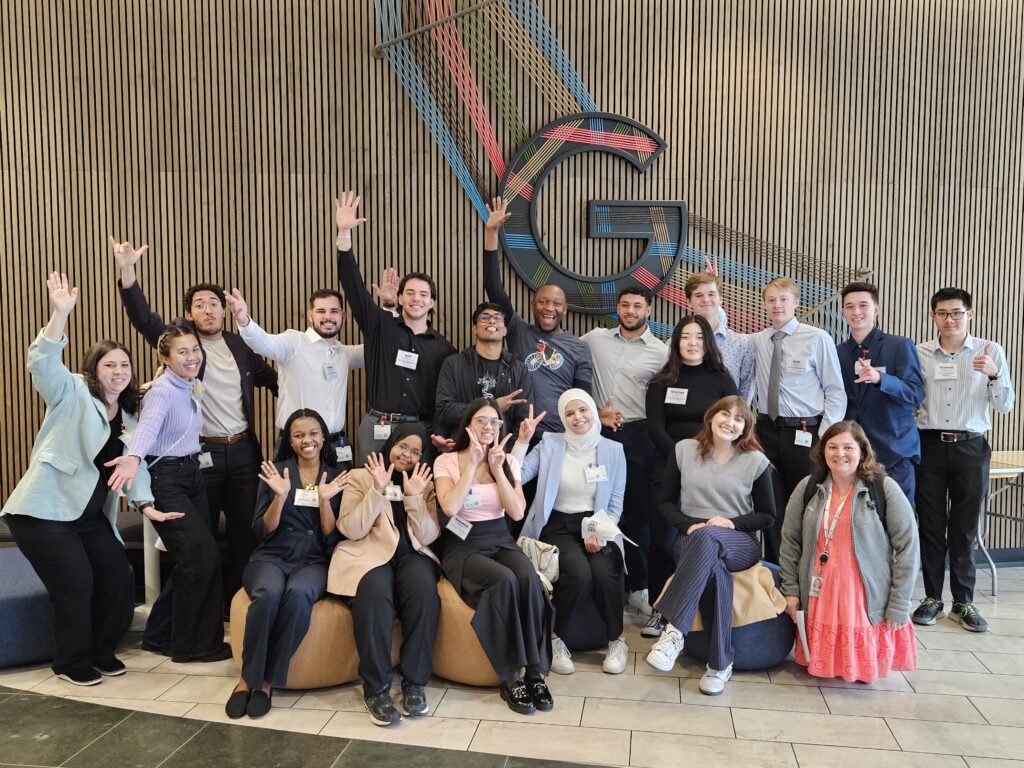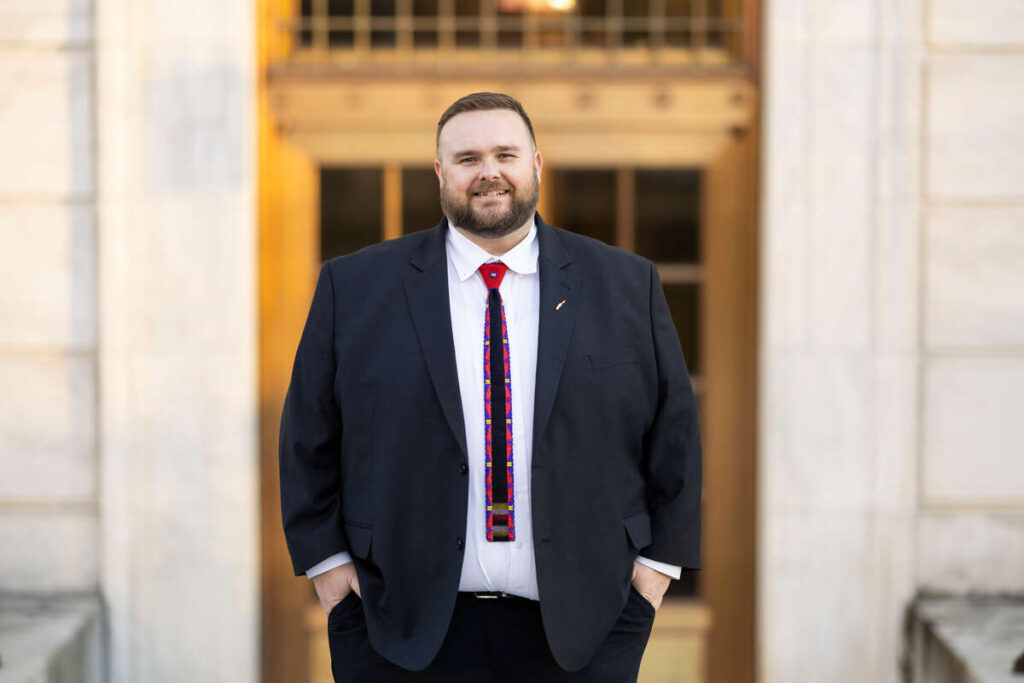When high school counselors asked César Osvaldo Mendez-Portillo if he planned to go to college, he said no. “I struggled with English and wasn’t ready to be in college,” said Mendez, who had attended LEAP, an alternative high school for new immigrants where the focus was on teaching students English and helping them to merge into American society.
His counselors, however, told him he had many college options, including the Dougherty Family College at the University of St. Thomas. “I visited the school and it was a really nice program and the students and faculty matched the energy of LEAP – you feel the community.”
Mendez, who is now a marketing major at St. Thomas and was elected in spring 2022 as vice president of equity and inclusion for Undergraduate Student Government, was accepted at several colleges he applied to, but ultimately decided to attend DFC.
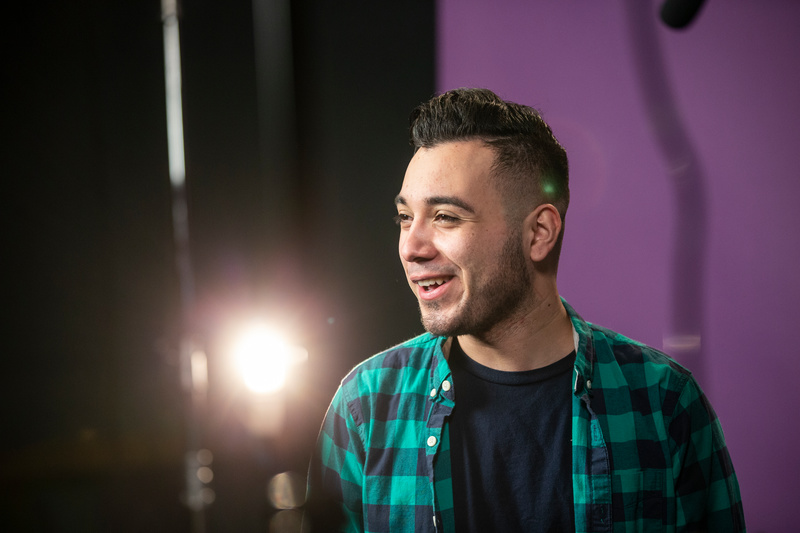
“I contrasted the support of the other schools and what I was getting,” he said. “The other schools gave me financial support, but DFC gave me the whole package. I was getting a computer, books, food, a bus pass. At the end of the day I had to make a choice and the best choice was DFC.”
Mendez was born and raised in El Salvador, in a small village of artisans. In La Palma, Chalatenango, where his family had no internet service and few people had phones, he enjoyed playing in the mountains with his cousins and expressing his artistic side through drawings and paintings, inspired by his grandma.
“The economy was bad where I lived,” he said. “My people focused on handicrafts for people; they paint stuff and they sell it. If you go to the city, people’s houses are painted with the coolest designs.”
His own love of painting unique designs is a part of his culture that he brought with him when he came to the U.S. at age 18 and moved in with his father, whom he hadn’t seen since he was a young boy. “I left my mom, my older brother and my two dogs. That was painful. I only had my dad in the U.S.”

But soon he had a new extended family. “My friends that I made at DFC became my brothers and sisters. These people became my family.”
Mendez excelled at DFC, which is located on the Minneapolis campus of St. Thomas. The cohort model school offers an associate degree designed to propel students toward success and provide a smooth transition to a four-year college.
“The transition to St. Thomas from DFC was different and I was excited about it,” said Mendez, who, upon receiving his associate degree, was awarded a full-tuition scholarship to pursue a bachelor’s degree at St. Thomas. “I was really involved with the St. Paul campus while at DFC. So, I knew people already. I knew the classrooms and the buildings and how to use the resources. At DFC we were an online school for two semesters because of the pandemic. And every day I went to the St. Paul campus to be online rather than being at home.”
His familiarity with the St. Paul campus, combined with his eagerness to help other Latinx students acclimate to the larger campus, led him to become a leader within the student group HOLA, an acronym for Hispanic Organization for Leadership and Achievement that also translates to “hello.” As a student group, it has the largest number of active members than any other organized cultural club at St. Thomas.
“I am the vice president of HOLA and running for president for next year,” said Mendez. “I started in my sophomore year as event coordinator of HOLA. It has been a journey and it has been a learning experience and I have met so many Hispanic and Latinx on campus. I am surprised to see how many Latinos there are on campus and how we are providing a safe space for Latinos and Hispanic students where we celebrate our culture and feel like we belong. And how St. Thomas as a community makes us feel like we belong. It has been amazing, the support we get from faculty and staff.”
He said, in some ways, St. Thomas is more than what some people may first perceive. “A lot of people think that St. Thomas is really a predominantly white school, and it is, but at the end of the day you really feel at home as a student of color. At St. Thomas, I was able to see myself reflected in other predecessors. I had my first African American professor in my life at St. Thomas. I know professors that are Latino, ones in the College of Arts and Sciences, School of Engineering and the [Opus] College of Business. I saw so many POCs teaching at St. Thomas and that was important – I saw a reflection in me. That has been amazing. That is one of the things I like about St. Thomas.”
As a member of one of the largest minority groups at St. Thomas, Mendez said that “sometimes people don’t notice us because Hispanic and Latinx people come in different colors and shapes. There are Afro Latinos, Indigenous Latinos and white Latinos.”
Mendez, who ultimately wants a job post graduation focusing on the Hispanic market, said he desires “to help corporations understand my community and how they can market their product to us. They are looking for people like me and how we do things.”
That aspiration and determination is one of the reasons he said yes to participating in the “We Are Tommies” TV campaign for St. Thomas. He stars in one of the first Spanish-language ads produced by the university and airing on Univision from mid-February to early May.
“I am involved in my community in the Twin Cities and I wanted to collaborate with St. Thomas, so I thought this is great, why not.”

The spot he is featured in focuses on how St. Thomas feels like family to him due to its small class sizes and how faculty really get to know their students.
The commercial will not be his first time appearing on TV. This past fall he was interviewed by a local TV news station when he was wearing a purple St. Thomas T-shirt while protesting against the Saint Paul Public Schools' planned closure of his alma mater LEAP and the Paul and Sheila Wellstone Elementary, a bilingual school with a strong Spanish immersion program. Ultimately, both schools had the target lifted and will remain open.
Mendez has a passion for advocating for students. He worked with the Saint Paul Board of Education on an initiative they just passed that will take effect in 2025 to have all students take an ethnic studies course in order to graduate high school. “As students we had to ask [for this], they didn’t come to us.”
When he’s not fulfilling his many obligations as a St. Thomas student and leader, local activist, or working at Starbucks or his new job at Amazon, one can usually find him at a local nonprofit on Mondays where he helps them distribute free items from their food shelf.
“I am also getting trained to help people prepare their taxes. I am excited about that,” he said. “And I am tutoring two kids - fifth graders who just moved to the U.S. a few months ago. I help them with their English. I know how coming to this country without knowing English is.”
Mendez credits his mother for instilling in him the importance of volunteering and serving one’s community. She has been on the La Palma City Council in El Salvador for years.
“She is the type of person who likes to be connected to her community. It helped me think and see the world differently,” said Mendez, who added that his mom tells him ‘If you can help people, do it. If you can support people, do it, and stay connected with your community.’ She likes to be bold and intense like me.”
And that’s why César Osvaldo Mendez-Portillo is a Tommie.
